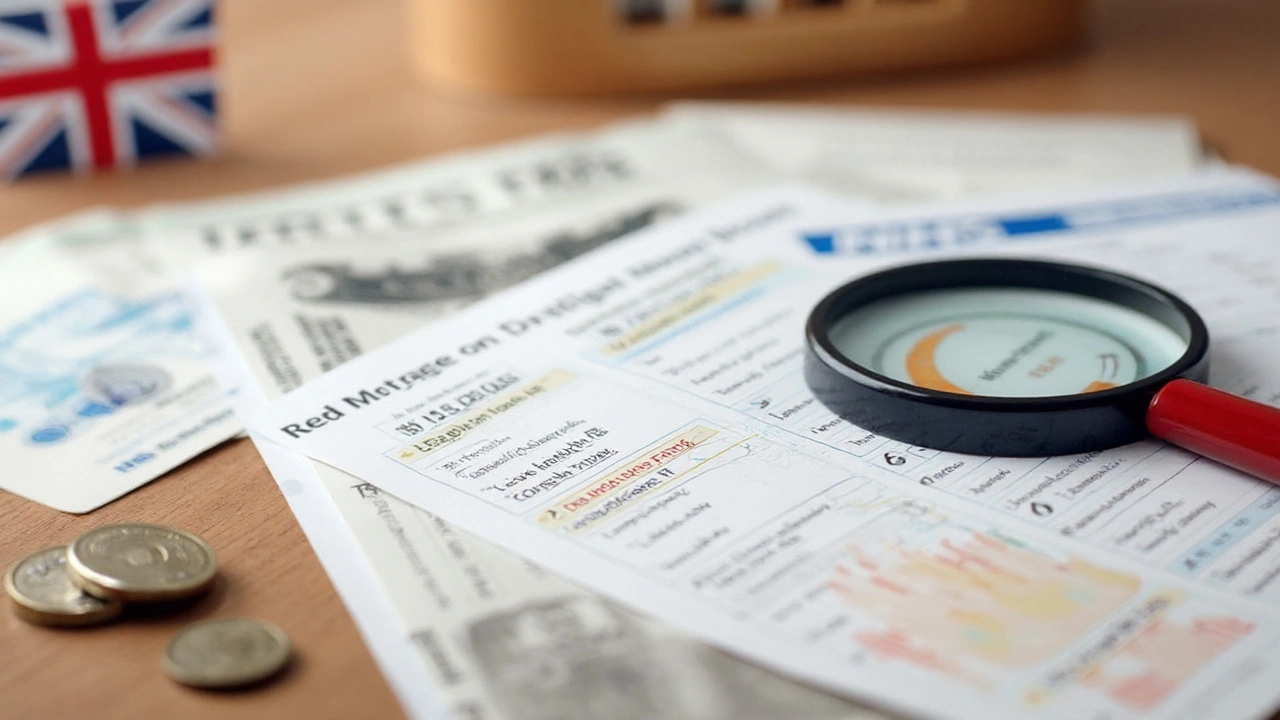Ever wonder why your credit score seems to drop at the weirdest moments, right after you finally make a smart move—like refinancing your mortgage? It's like you do something that makes financial sense, and your credit takes a dip as a thank you. The truth is, refinancing can nudge your score down a bit. But it's often not as scary, damaging, or permanent as folks think. Most of the impact is temporary and pretty minor, but some surprises can pop up if you’re not prepared. The best part? You can totally work around most credit dings when you know where they come from and how to handle them.
What Happens to Your Credit Score When You Refinance?
You're probably thinking: does one application tank my credit, or is it the whole process? Here’s how it plays out. First, there’s the credit score hit from what's called a hard inquiry. When lenders check your file to see if you’re good for a new loan, they leave a little mark—this is a hard inquiry. Usually, one inquiry dings your score by just a few points, sometimes between 3 and 5, though for people with shorter or more troubled credit histories, the drop can be a bit more noticeable.
Now, where folks really get nervous is when they shop around for rates. Don’t sweat it. FICO and VantageScore, the big names behind credit scores, both treat multiple mortgage inquiries made within a short window—usually 14 to 45 days—like they’re just one. So if you talk to three different lenders in three weeks, your score doesn’t drop three times. They want you to shop for better rates, not penalize you for it.
Here’s what often gets overlooked: refinancing means closing your old mortgage and opening a new one. Sometimes, closing a longstanding account (especially if it was your oldest loan) can nudge your average account age down, but mortgages are usually big, and their age isn’t as critical as on credit cards. Plus, old positive data often sticks on your report for up to a decade, so you still get some credit history brownie points. One quirky thing: when the new loan shows up and the old one closes, your report can look different for a while, which can momentarily nudge your score up or down depending on how those accounts stack up.
Want a snapshot? Check out this table:
| Step in Refinancing | Potential Credit Impact | How Long Effect Lasts |
|---|---|---|
| Hard inquiry from application | Drop of 3-5 points | Up to 1 year (most impact fades in weeks) |
| Old mortgage account closed | May slightly lower score if it was an old account | Effect fades over months-years; closed accounts can stay for ~10 years |
| New mortgage added | Temporary drop from new account | Score tends to recover in 3-6 months |
It’s easy to freak out over any dip, but the numbers here are small—most people see only a tiny wobble unless they’re refinancing again and again in a short period. Definitely not something to panic about if your credit was in the safe zone to begin with.
Short-Term vs. Long-Term Credit Effects
Right after refinancing, your credit score might look a little bruised. But let’s separate myths from facts. A Consumer Financial Protection Bureau (CFPB) study showed most people's scores bounce back within a few months, sometimes quicker. The main culprit for the drop is the new hard inquiry and a new account showing up—which lenders don't like as much as long and stable relationships. If you keep paying on time, though, that new loan quickly becomes a positive mark in your credit history.
One interesting twist: sometimes refinancing helps your credit in the long run, especially if your new payments are lower and you’re less likely to miss any. Payment history makes up about 35% of your FICO score, so nailing those new payments is a big deal. Miss a payment? That hurts way more than a soft credit dip from a hard inquiry.
Your old account’s age might shift your score, but not by much. FICO says length of credit history is worth 15% of your score. Losing an old mortgage doesn’t erase years of history overnight. Closed mortgages with positive payment history can hang around on your credit report for up to a decade, keeping your "good behavior" in the record books. Also, your credit mix—having different types of credit (like mortgages, cards, and car loans)—makes you look smarter to lenders, and a new mortgage keeps that mix going.
Your total debt also matters. If you’re refinancing and taking cash out, your new mortgage balance is higher, and that could bump your "amounts owed" a little higher compared with your income. Not a crisis as long as you’re not maxed out on every loan you’ve got.
If you’re eyeing a major purchase—say, you need an auto loan or want to open a big credit card soon after refinancing—timing matters. Your score will probably be at its lowest right after closing. Wait a couple months and you’ll likely see a rebound. The good news? Scoring models are forgiving if you only refinance once in a while, not every six months.

How to Minimize The Credit Impact of Refinancing
Refinancing is a powerful tool, but a little prep goes a long way in making sure your credit barely feels a thing. First up, check your credit report before you start applying. Sometimes there are weird errors—think accounts you didn’t open or payments marked late that weren’t. Fixing these beforehand means your score’s as high as it should be when lenders start poking around.
Try to keep all your mortgage inquiries within a short window—ideally 14 to 45 days—so they count as one inquiry. That keeps your score safe while you rate-shop. Don’t open new credit cards or take on other big loans right before or during your refinancing. Each new account can nick your score, and too many applications at once can send up red flags.
If you can, set up automatic payments on your new loan. This slashes the odds of missing a due date—and payment history is still the most important thing. Even one late payment dings your score worse than any other single action in the refinancing process.
Avoid the temptation to pull out as much cash as possible when you refinance. Cash-out refinancing means a bigger loan balance, which bumps up your "amounts owed". If you’re using the cash to consolidate high-interest credit cards, you might break even or come out ahead. But if it’s for a splurge, that higher balance sticks around and might be a problem for your next credit application.
Want a checklist to make life simple?
- Pull your credit report and clear up errors before applying.
- Shop for rates within a tight window.
- Avoid other big credit moves at the same time.
- Set up autopay to avoid missed payments.
- Only pull out cash if you actually need it—and have a plan.
Keep an eye on your score (there are free tools everywhere), especially in the three months after you close. You’ll be able to spot any drops, track your recovery, and catch problems before your next big financial move.
Does the Type of Refinance Matter?
Not all refinancing is created equal when it comes to your credit. Simple rate-and-term refinances (where you’re just swapping out your old mortgage for a new one with different terms) usually have the smallest impact. It’s almost like a gentle swap—one account closes, one opens. Credit impact is minimal and recovers quickly. But cash-out refinancing, where you’re pocketing equity from your home as cash, means a bigger loan. Credit bureaus notice that jump in debt, so the score dip might be a hair bigger, especially for folks already struggling with debt levels.
Refinancing federal student loans into private ones? Slightly different animal. You trade government-backed perks for a new loan, which does show up as both a closed and a new account. If you had multiple student loans, paying them all off with a single refinance leaves your credit mix a little thinner—one account replaces many. But, like with mortgages, consistent on-time payments can actually help you long-term.
Car refinancing? Same playbook. Apply, take a small hit, and carry on. The difference is car loans are usually a smaller percent of your credit profile, so the impact is even tinier, unless you shop around for months.
Some lenders do a "soft pull" for pre-qualification, which doesn’t affect your score. But once you formally apply, expect a hard pull. If you’re only curious and want to window-shop, stick with pre-qualification offers until you’re serious about moving ahead.
More people are refinancing than ever. The Mortgage Bankers Association saw millions of refinance applications spike during low-rate periods in 2022 and 2023. Lenders are set up for it, and credit bureaus are now more forgiving of the multiple inquiries this triggers—just keep them close together, like one shopping trip rather than a bunch of scattered outings.
The takeaway: almost every "regular" type of refinancing, whether mortgage, student loan, or car, has about the same very small, short-term impact. The long game is about what you do after closing—on-time payments matter way more. Your credit score is like your fitness level. Skipping one workout doesn’t make you unhealthy, just like refinancing doesn’t wreck your credit if you handle it smartly.

